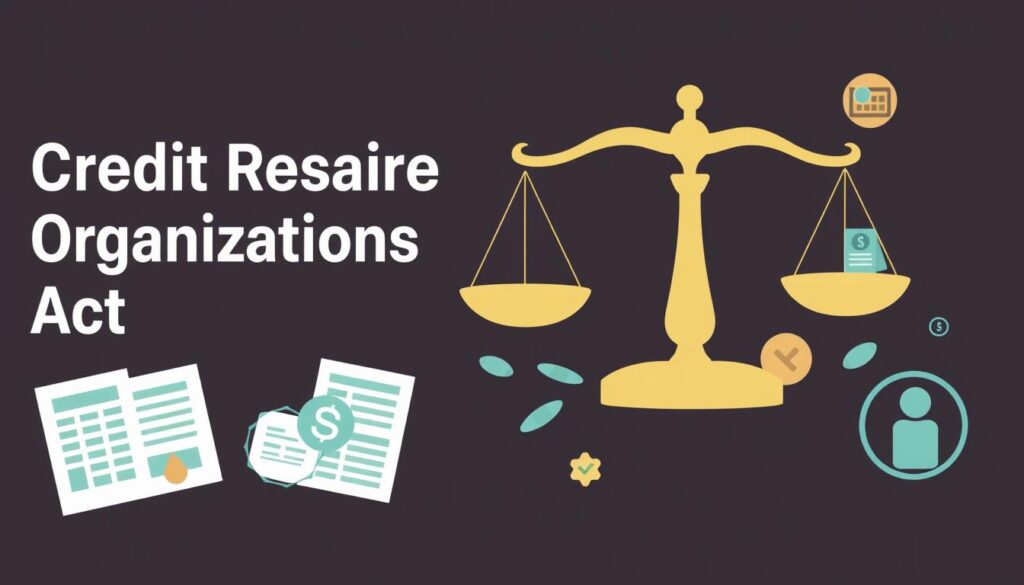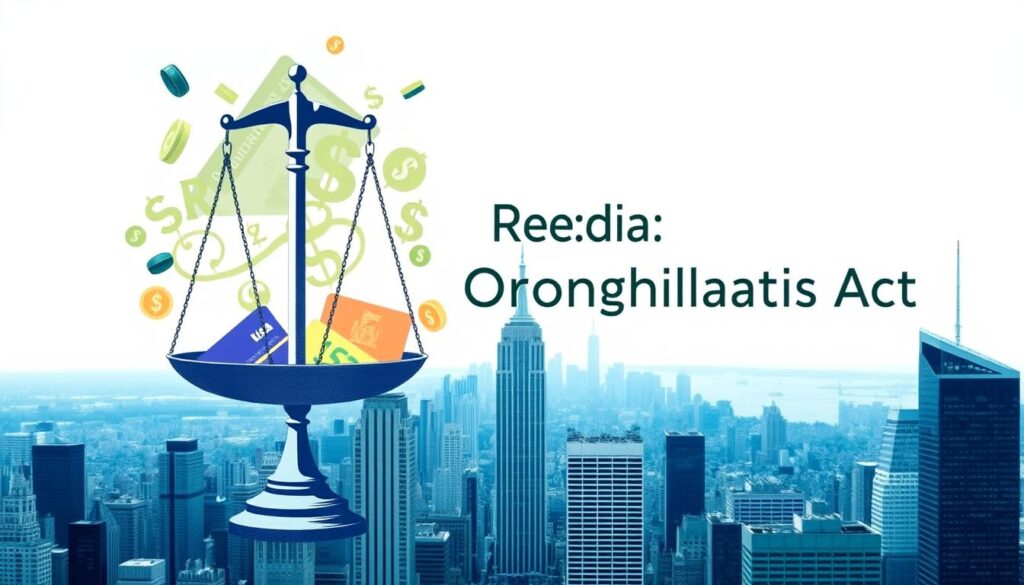The Credit Repair Organizations Act (CROA) came into effect in 1996. It shields consumers from dishonest credit repair companies. CROA sets rules for these companies to work ethically and openly.
Key Takeaways
- CROA was enacted in 1996 to safeguard consumers from unethical credit repair companies.
- The act sets standards and guidelines for credit repair organizations to operate transparently and honestly.
- CROA aims to empower consumers by informing them of their rights and preventing credit repair scams.
- The law is closely linked to the Fair Credit Reporting Act, which also protects consumer credit information.
- Understanding CROA is crucial for both consumers and credit repair businesses to ensure compliance and ethical practices.
What Is the Credit Repair Organizations Act (CROA)?
The Credit Repair Organizations Act (CROA) is a federal law that sets rules for credit repair companies. It protects consumers from unfair tactics and ensures they have proper information about credit repair services.
Overview of CROA
CROA was created to address issues with some credit repair companies. These firms often made false promises or used unethical methods to boost credit scores.
The act sets rules that credit repair organizations must follow to operate legally. This helps protect consumers from deceptive practices in the industry.
Purpose and Objectives of CROA
- To prevent credit repair organizations from making false or misleading claims about their services
- To ensure credit repair organizations provide consumers with accurate information about their rights and the services they offer
- To prohibit credit repair organizations from charging upfront fees for their services
- To give consumers the right to cancel their contract with a credit repair organization within three business days
- To provide consumers with a way to file complaints against credit repair organizations that violate the law
CROA empowers consumers and protects them from predatory practices. It gives people more rights when dealing with credit repair companies.
The law also helps improve the integrity of the credit repair industry. This makes it safer for consumers to use these services.
“The Credit Repair Organizations Act was enacted to address the growing concerns about the practices of some credit repair companies, which often made false promises or engaged in unethical tactics to improve consumers’ credit scores.”
When Was the Credit Repair Organizations Act Enacted?
The Credit Repair Organizations Act (CROA) became law in 1996. President Bill Clinton signed it, and it took effect on April 1, 1997. This law set up rules to fight misleading credit repair practices.
Before CROA, the credit repair industry had little oversight. Many people fell victim to false promises and tricks. The new law helped protect consumers and improve trust in credit repair.
| Year | Event |
|---|---|
| 1996 | The Credit Repair Organizations Act (CROA) was enacted by the U.S. Congress |
| 1997 | CROA went into effect on April 1, 1997 |
CROA brought big changes to the credit repair industry. It set clear rules and limits to protect people. The Act helped individuals take charge of their money matters.
CROA still plays a key role in keeping the credit repair industry honest. It protects consumer rights across the country. The law shows how important rules are for tackling money issues.
the credit repair organizations act (croa) was enacted in
Historical Context and Background
The Credit Repair Organizations Act (CROA) transformed the credit repair industry. Before CROA, the industry lacked regulation, allowing shady companies to deceive consumers. This led to widespread exploitation and a need for protective legislation.
CROA established guidelines for credit repair organizations to follow. It created a framework to ensure ethical practices and transparency. The law aimed to empower consumers and protect their rights during credit repair.
CROA’s enactment showed the government’s dedication to consumer protection. It laid the groundwork for a more accountable industry. This legislation helped consumers navigate credit repair with greater confidence.
“The enactment of CROA was a critical step in addressing the widespread consumer exploitation that had plagued the credit repair industry for years.”
Key Provisions of the Credit Repair Organizations Act
The Credit Repair Organizations Act (CROA) regulates credit repair services. It protects consumers from unethical practices. The act ensures transparency in the credit repair industry.
Restrictions on Credit Repair Organizations
CROA limits services, fees, and disclosures of credit repair organizations. It bans false claims about removing accurate negative information. Organizations must provide written contracts outlining services and costs.
- Restrictions on the types of services credit repair organizations can offer
- Limitations on the fees credit repair organizations can charge
- Mandatory disclosures to consumers about the credit repair process and their rights
- Prohibition on making false claims or guarantees about credit report improvements
CROA safeguards consumers from credit repair organizations using deceptive or unfair practices. It ensures people get honest help when seeking credit repair services.

| Provision | Description |
|---|---|
| Restrictions on Services | Credit repair organizations are limited in the types of services they can offer, such as prohibiting the promise of removing accurate negative information from credit reports. |
| Fee Limitations | The act sets limits on the fees credit repair organizations can charge for their services, ensuring affordability for consumers. |
| Disclosure Requirements | Credit repair organizations must provide consumers with detailed information about their services, including the total cost and the consumer’s legal rights. |
CROA’s key provisions shield consumers from unethical credit repair practices. They promote transparency in the credit repair services industry. These rules ensure accountability for organizations offering credit repair.
Consumer Rights Under CROA
The Credit Repair Organizations Act (CROA) protects consumers working with credit repair organizations. It ensures fair and transparent service for improving credit profiles.
CROA grants specific rights to safeguard individuals. These rights help consumers make informed decisions about credit repair services.
- Right to Cancel: Consumers have the right to cancel a contract with a credit repair organization within three business days without penalty.
- Written Contract: Credit repair organizations must provide consumers with a written contract detailing the services to be provided and the associated costs.
- Copy of Credit Report: Consumers have the right to receive a copy of their consumer credit report before any services are rendered by the credit repair organization.
The Fair Credit Reporting Act (FCRA) and CROA outline these consumer rights. They aim to shield individuals from unethical practices.
| Consumer Right | Description |
|---|---|
| Right to Cancel | Consumers can cancel a contract with a credit repair organization within 3 business days without penalty. |
| Written Contract | Credit repair organizations must provide a written contract detailing the services and associated costs. |
| Copy of Credit Report | Consumers have the right to receive a copy of their credit report before any services are provided. |
These consumer rights under CROA protect people seeking credit repair services. They provide necessary information for informed decisions.
Understanding these rights helps consumers navigate the fair credit reporting act. It also guards against potential exploitation by unethical credit repair organizations.
Importance of CROA for Credit Repair
The Credit Repair Organizations Act (CROA) guards consumers in the credit repair industry. It aims to protect people from unfair practices. CROA ensures credit repair companies are honest and clear.
Protecting Consumers from Unethical Practices
Before CROA, the credit repair industry had many scams. These often hurt people’s finances. CROA sets clear rules and limits for credit repair companies.
It helps people make smart choices. The law stops companies from using unfair or misleading tactics. CROA empowers consumers to protect themselves.
- CROA prohibits credit repair organizations from making false claims about their services or the results they can achieve.
- The law mandates that credit repair companies provide clients with a written contract detailing the services to be provided, the timeline, and the total cost.
- CROA also grants consumers the right to cancel their contract within three business days without penalty, ensuring they have the opportunity to reconsider their decision.
CROA sets standards to protect consumers. It guards against predatory practices in credit repair. This law helps keep people’s finances safe.
“CROA is a critical piece of legislation that has been instrumental in curbing unethical practices and promoting transparency within the credit repair industry.”
CROA is vital for consumer protection. It gives people confidence when seeking credit repair services. The law helps prevent scams and harmful tactics.

Compliance with CROA for Credit Repair Businesses
Credit repair organizations must follow the Credit Repair Organizations Act (CROA) to operate legally. This protects consumers and helps businesses avoid severe legal penalties.
CROA requires credit repair companies to provide a written contract to consumers. The contract must detail services, costs, and client rights. CROA also bans advance fees before services are completed.
- Provide consumers with a written contract outlining the services, costs, and their rights
- Refrain from collecting advance fees before fully completing the credit repair services
- Adhere to CROA’s restrictions on credit repair organizations to maintain compliance
Breaking CROA rules can lead to legal action and financial penalties. It may also damage a company’s reputation. Following CROA shows commitment to consumer protection and compliance.
This builds trust and credibility with clients. It’s crucial for credit repair organizations to prioritize CROA compliance in their operations.
“Compliance with CROA is not just a legal requirement, but a moral obligation for credit repair organizations to protect the interests of their clients.”
By following CROA, credit repair businesses can operate ethically and avoid legal issues. This approach safeguards consumers and maintains a positive industry reputation.
Impact of CROA on the Credit Repair Industry
The Credit Repair Organizations Act (CROA) has changed the credit repair industry. It increased regulation and oversight. This forced companies to be more transparent and ethical, putting consumer protection first.
Changes and Regulations Brought by CROA
Before CROA, the credit repair industry had little regulation. Some companies used unfair practices to take advantage of vulnerable consumers.
CROA transformed this landscape. It required organizations to provide detailed service and fee disclosures. The act also banned false claims about improving credit scores.
CROA gave consumers the right to cancel contracts within three business days. It also allowed legal action against companies violating the act.
- Requiring credit repair organizations to provide detailed disclosures about their services and fees
- Prohibiting credit repair companies from making false or misleading claims about their ability to improve credit scores
- Giving consumers the right to cancel their contract with a credit repair organization within three business days
- Empowering consumers to take legal action against credit repair companies that violate CROA
These rules made the credit repair industry more transparent and accountable. This benefits consumers seeking help to improve their credit profiles.
“CROA has been a game-changer for the credit repair industry, driving companies to adopt more ethical practices and putting the power back in the hands of consumers.”
CROA upholds consumer protection principles. It shapes the credit repair industry. The act ensures people can access trustworthy services.

Relationship Between CROA and Fair Credit Reporting Act
The Credit Repair Organizations Act (CROA) and Fair Credit Reporting Act (FCRA) protect consumers during credit repair. CROA regulates credit repair organizations, while FCRA oversees credit bureaus and information furnishers. These laws ensure consumer rights when dealing with credit issues.
The FCRA sets guidelines for credit reporting agencies and information furnishers. It gives consumers the right to dispute inaccurate credit report information. Credit bureaus must investigate and correct errors promptly.
The CROA focuses on credit repair organizations’ practices. It prohibits false claims and requires detailed contracts. Consumers can cancel services within three business days.
Together, CROA and FCRA create a strong framework for consumer rights. They ensure ethical operations of credit repair companies. This approach prevents predatory practices and empowers consumers to manage their finances.
Limitations and Criticisms of CROA
The Credit Repair Organizations Act (CROA) has addressed many credit repair industry issues. However, some argue it doesn’t provide strong enough consumer protections. Critics say CROA needs to regulate the industry more thoroughly.
CROA’s restrictions on advance fees have caused problems. These rules make it harder for legitimate credit repair companies to operate effectively. Some suggest changing the law to allow more flexible fee structures.
- CROA’s limitations in regulating the credit repair industry more comprehensively
- Concerns about the law’s restrictions on advance fees, which may hinder legitimate credit repair companies
- Calls for stronger consumer protections and more robust oversight of the industry
CROA doesn’t tackle the root causes of unethical credit repair practices. Experts propose more comprehensive reforms to protect consumers long-term. These include improving financial education and addressing poor credit’s underlying issues.
“While CROA has been a valuable tool in addressing the credit repair organizations act, its limitations highlight the need for ongoing efforts to improve consumer protections and industry oversight.”
The debate about CROA’s effectiveness and limitations continues. The credit repair industry keeps evolving. Policymakers, consumer advocates, and industry stakeholders seek balance between protection and flexibility.

Recent Updates and Amendments to CROA
The Credit Repair Organizations Act (CROA) has seen updates over time. These changes aim to protect consumers and improve industry regulations. They address new challenges in the credit repair market.
The Fair Credit Reporting Act Clarification Act of 2018 was a key amendment. It clarified roles between CROA and FCRA. This helped improve coordination and compliance across the industry.
In 2020, CROA addressed online credit repair services. New rules covered electronic signatures and disclosure requirements. These ensure clear information for consumers using digital services.
2021 brought stronger consumer protections against misleading practices. Updates included stricter rules on upfront fees and service timelines. Penalties for non-compliance also increased.
The CROA will likely see more changes as the industry grows. These updates will tackle new issues and protect consumers. Credit repair businesses must stay informed about these evolving requirements.
“The Credit Repair Organizations Act has been a crucial safeguard for consumers, and its continued refinement ensures that the credit repair industry remains transparent and accountable.”
Conclusion
The Credit Repair Organizations Act (CROA) protects consumers from fraudulent credit repair practices. It sets guidelines for credit repair companies, promoting transparency and ethical conduct. CROA safeguards the rights of people trying to improve their credit profiles.
CROA has significantly impacted the credit repair industry. It ensures consumers aren’t exploited by dishonest businesses. The law gives people access to accurate information and fair treatment when rebuilding credit.
CROA’s legacy remains crucial in protecting consumer rights. It promotes responsible credit practices as the industry evolves. Continued enforcement of CROA is vital for maintaining progress.
Refining CROA will help it adapt to changing consumer needs. By upholding CROA’s principles, the industry can better serve the public. This contributes to the financial well-being of individuals across the country.

